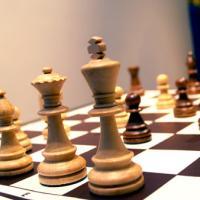
Chess is Good for Your Mind
Many people believe, or perhaps hope, that playing the game of chess is somehow beneficial. Ben Franklin wrote an essay that is widely available on the web about how chess improves one’s moral character. Let’s consider more broadly what the benefits of chess might be and what one could learn from chess beyond the game itself. It is my desire that these thoughts may benefit some of the younger readers, giving them the advantage of knowledge gained through the hardship of another’s direct experience.
One of the great lessons of life is this: perseverance pays. There is a myth that the great prodigies of chess achieve their glory through some divine infusion of ability that “just comes naturally” to them. While genetics and environment may occasionally conspire to form an individual uniquely suited to learning some skill, it is plain that behind genius lie bitter determination and solitary study. Bobby Fischer, that quintessential chess prodigy, was a profound scholar of the game. All honest chess masters will confirm their long hours of both study and practice. And so it is with all forms of mastery, be it chess, sword fighting or the creation of Belgian lace. But you need not have mastery as your goal. Your skill at any endeavor will be in direct proportion to your time spent in study and practice.
Chess can lead you to another truth. If you want to achieve uncommon success, then act uncommonly. By this I mean that you should act creatively and with initiative. Do not despair thinking that creativity and initiative cannot be learned, for they can be. Collections of puzzles and books on tactics will train your mind in these qualities.
Whether your game is chess or life, if you aspire to mediocrity, then play passively. Take no chances. Make the obvious move. Surprise no one, least of all yourself. But if you value something more, then consider the move that is audacious; push the pawn to its death; be bold. An oft-quoted line from the German poet Goethe reads, “Whatever you can do or dream you can, begin it. Boldness has genius, power and magic in it.”
The most exciting of all tactical combinations involve sacrifices. Lose the Queen, win the game. This is true of more than chess. Success in school, business and social relationships involves sacrifice. If you strive only to take more than you give, you will end up poorer than when you started. But give wisely. Gratuitous sacrifice is either stage bluster for the haughty or defeatism for the weak and ignorant.
Complex systems are holistic in nature. The pawn advance on the edge of the board restricts her majesty’s movement far afield. The opening moves impact the structure of the end game. How you live your childhood will affect your adolescence. The choices you make in adolescence will either restrict or broaden the choices you have in adulthood. Your career will determine your retirement.
The weak are powerful. The strongest rook will cower if attacked by a pawn. The well-placed pawn may metamorphose into Queen and become mistress of all she surveys. The downtrodden will rise up and vanquish the tyrant. Hence the wise will respect all players on the boards of chess and life. Everyone has an integral role, and the role often changes. The classmate or co-worker you demean today may become your boss a decade hence.
Chess teaches us how to make complex choices and that there are tradeoffs in all such choices. Do I want my extra pawn, or should I give it back in exchange for a better position? Which do I value more? I can give up my two-bishop advantage to rid my opponent of his powerful knight. If I advance my pawn to gain space, I will weaken the dark squares around my king. Do I want to work on Saturdays in order to save for a down payment on a new car? The choice involves a tradeoff.
We improve our chess game more by studying our defeats, not our wins. Rare is the life that proceeds with one win followed closely by the next. Even the most successful will often have a past strewn with interim failures. But read the memoirs of those most successful of people and you will learn that they too studied their defeats, and it was those very defeats that informed their future decisions, leading ultimately to success.
Thus when you are defeated do not become angry, bitter or depressed. Lose with grace and wisdom. Learn from every blunder. Make a note of your errors and your opponent’s strengths. Your opponent is your teacher. Defeat is your professor. Study the game as well as yourself. And choose your move carefully, in chess as in life.
N.B. For an alternative view, see my sequel blog: Chess is Bad for Your Mind

